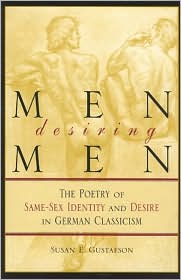

 |

|

The average rating for Men Desiring Men: The Poetry of Same-Sex Identity and Desire in German Classicism based on 2 reviews is 3 stars.
Review # 1 was written on 2013-04-14 00:00:00 Christopher ROOP Christopher ROOPFor a joke book, this was anything but funny. The author did a great job with this collection of jokes, stories and cartoons from before, during, and after the Nazi rule. By focusing on humor as a form of resistance, the author shows the rise and fall of the Third Reich through the viewpoint of the average German citizen. The jokes are divided in different topics and categories, with explanations about the historical context, language and wordplay, and references that a non-German reader wouldn't be likely to understand. A harrowing and informative read about the horrors of war and the danger of authoritarianism. |
Review # 2 was written on 2014-07-04 00:00:00 Stephane Charbonneau Stephane CharbonneauA Dubious Past is a serious, scholarly work, so significant effort is required on the part of the reader. It is a study of how the literature of German intellectual-warrior Ernst Junger fits into the history of ideas, particularly in post- WWII Germany. Junger was a highly decorated combat officer during WWI. He later served as a censor in occupied Paris during WWII. His novel recounting combat in the First World War, Storm of Steel, is highly regarded, as are some of his later novels, such as The Marble Cliffs. (I enjoyed The Glass Bees, a prescient look at technology.) He is a controversial figure in that his conservative views in non-fiction writing have been labeled by leftist critics as a guide to formulating the policies of Hitler's Third Reich. He wrote, and often acted, in a cool, detached manner, although his powers of observation and analysis assured him of an appreciative audience. Author Neaman strives to present a balanced assessment of Junger and his writing. He is largely successful in this effort. He points out that Junger was not a member of the Nazi party, did not allow the party newspaper to reprint his writings, and that The Marble Cliffs reads as an anti-Nazi novel. Further, Neaman writes that Junger was neither a racist nor an anti-Semite. He was anti-democratic and a believer in tradition-based, authoritarian governance. Neaman also details Junger's strong concern with the destruction of nature by increased use of technology. He was a serious student of entomology, having seven species of beetles bearing his name. Neaman calls Junger on his early resort to relativism in discussing German war crimes. Junger pointed out the extensive murders conducted by the Soviets, and held the occupation of Germany by the Four Powers to be equivalent to German occupations across Europe. The history of ideas is a complex field of study. It incorporates here politics, philosophy, and literary criticism among other subjects. Within these parameters, all of which are subject to change, Neaman closely examines how the writings of Junger play out culturally and politically. An added complication to this task is that Junger lived to the age of 102 years, actively engaged until the end. An interesting point raised is that some of the leftist students who led the uprisings across Europe in 1968 later came to embrace some of the views of Junger by the 1990s. A recurrent theme in the book is the high regard in which Junger was held in France during and after WWII. During the occupation of Paris, both members of the resistance and the collaborationists spoke well of him. He socialized with the literary and artistic collaborators and other members of the French haut monde. These included such names as Pablo Picasso, Jean Cocteau, Georges Braques, and Alfred Fabre-Luce. Many of his French friends would come to his support when there was great controversy when he was awarded the Goethe Prize in 1982. Some observed that Junger was more revered in France than in his own country. Who should read this book? Literary scholars will derive the greatest benefit, of course. It may well be a five-star pick for some of them. Otherwise, serious readers, those who are interested in how books and authors fit into a larger socio-political framework, will be able to take away much from A Dubious Past. I found it a stretch, and was not able to reach into the gauzy constructs of philosophy found there, but am glad to have read it. |
CAN'T FIND WHAT YOU'RE LOOKING FOR? CLICK HERE!!!